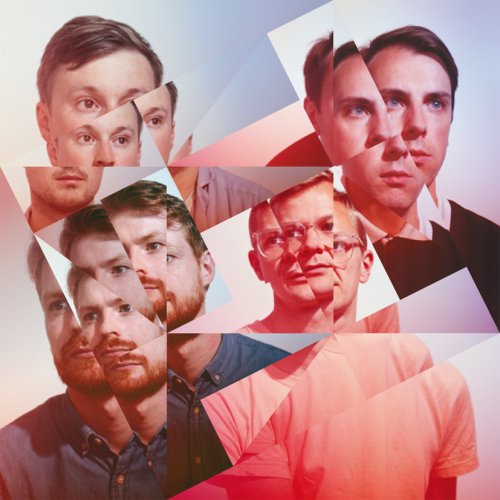This Article originally appeared in The Herald newspaper (Scotland) on Thursday February 16 2012, under the heading A JOURNEY, NOT A TRIP.
Django Django helmsman David Maclean is recalling a yarn from Christmas past that would rival the glare of the music he makes.
“Everyone was at ours in Tayport,” he says of his family home in Fife. “So it was the Beta Band, The Phantom Band, Django Django and the Super Furry Animals, all playing Trivial Pursuit on Christmas Day. Then Gordon Anderson – you know, the Lone Pigeon [and brother of King Creosote] – came round and started playing table tennis on the Wii. And I thought, ‘ah, this is probably why we all sound similar.’ It’s a family affair.”
Maclean’s colourful family tree is entwined in art and creativity: his parents are acclaimed visual artists Marian Leven and Will Maclean; his older brother (and recent BAFTA-winning film-maker) John was in the Beta Band and the Aliens with Anderson; his childhood best friend is Andy Wake of The Phantom Band. “And my cousin goes out with one of the Super Furry Animals,” he adds.
Maclean and Wake’s pop parallels are notable. Both are also visual artists, and while neither is a singer or frontman, they’ve become the navigators of two of Scotland’s most inventive bands. “I don’t know why that is,” Maclean reflects. “We both grew up being totally obsessed with records, and we both shared a love of DJing, and I guess we just had quite parallel upbringings.” Maclean operates as the Djangos’ drummer, producer and aesthetic guru. “I think it’s maybe quite good to have somebody in the background that’s got ideas, and is willing be a kind of overseer, to push things in the right direction,” he offers.
Edinburgh and London also have starring roles in the tale of Django Django. The four-piece – comprising Maclean, singer / guitarist Vincent Neff, bassist Jimmy Dixon and synth-diviner Tommy Grace – met at art school in Edinburgh and are now based in East London. They released a single, Storm / Love’s Dart in 2009, and soon established a reputation for day-glo, oft-surreal live shows thanks to a support slot with aerobic overlord Mr Motivator, an eye-popping line in sartorial flair, and a percussive arsenal that went heavy on coconuts. Last year, they signed to French label Because (Justice, Jarvis Cocker), and they’ve just released their bedazzling self-titled debut. Place your Mercury bets, if you’re one for a flutter.
Despite the band’s roots in Scotland and London, their exotic, arcane collage-rock conjures Egypt, the Middle East, the cosmos, space cowboys, the far-flung future and the ancient past. That is to say, Django Django sound like everything (and everywhere), other than the here and now.
“I guess escapism’s quite a good word,” offers Maclean of their kaleidoscopic impetus. “We made the record in a dingy flat with no money in Hackney, just looking out the window, and you can’t help but want to sort of escape. People are quite to tag it our music as psychedelic, but in a way it’s more than psychedelic. It’s more about ideas than just sort of brainlessly tripping out or whatever, but it does have that idea of escapism or assisted dreams, and that’s something we’re all really into, from comedy like Monty Python [hence the coconuts] or weird films, and also stuff like sci-fi and larger ideas of who are we and where we come from.
“Those big questions and big ideas – not religious, more kind of agnostic – got me into reading a lot of esoteric and bizarre books, and they put weird ideas in my head that ended up in the music,” he continues. “So Skies Over Cairo goes back to reading [Erich Von Daniken’s 1968 treatise] Chariots of the Gods, which is this daft book about the idea that aliens came down and built the pyramids. It’s just about having fun with these ideas, and using these broad influences.”
These themes of humanity, prehistory and the universe reverberate in Django Django’s tribal beats, polyrhythms, cosmic synths and Middle Eastern flourishes. “I think that’s a subconscious thing,” offers Maclean. “I’d done the album cover [also in the desert / alien vein] before we’d even started doing anything, and I think in the back of my head that sort of dictated this dusty, sandy, otherworldly thing.
“Also, a lot of the surf and old rock ‘n’ roll records we were listening to have this idea of the exotic that’s a kind of pastiche-y, fun idea of Egypt and the Middle East. Like Joe Meek – he’d have a lot of these weird jungle-y or Egyptian references,” he says of the pop trailblazer and producer, whose eccentric 60s space-rock fantasy, I Hear a New World, is echoed by Django Django.
Has London’s multicultural backdrop played its part in the Django aesthetic? “Yeah definitely,” nods Maclean. “Going to Turkish restaurants every night and going to the markets where there’s always African music playing – that can’t help but just sort of seep in to what you do. I remember the first time I went to London, just getting an absolute buzz out of being surrounded by so many cultures.”
Maclean credits his “first love” of DJing, meanwhile, for the band’s maximalist (yet beautifully-honed) approach, and for the album’s recording process. “I came at it from a dance music angle, where everybody makes records in their bedroom,” he says. Maclean and his band remain light years away from the realm of pensive bedsit bards, however. “I don’t think we’ll ever write a kitchen-sink drama”
Stereo, Glasgow, Feb 29 (rescheduled from Feb 19); Fence’s Eye O’ The Dug, St Andrews, April 14; Django Django is out now.

